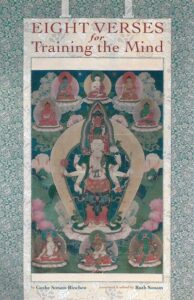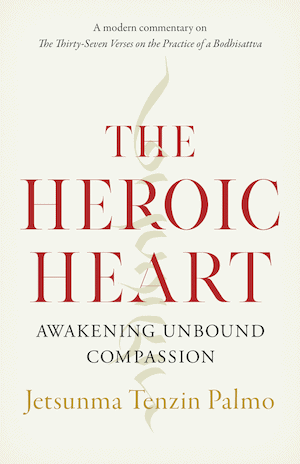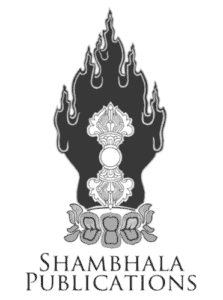suffering to opportunity: “… life itself is a gymnasium of the soul … Life is where we have our workout … where we train … Atisha gave teachings on how to take the vicissitudes of life onto the path …“ ~ Jetsunma Tenzin Palmo
We opened this year with Elias Amidon’s thoughts on why embracing selflessness is a gift … and today, in this 2nd post of the year, we consider how the ancient practice of lojong or mind training can help us experience the gift arising from embracing suffering (or adversity) …
The lojong practice was brought to Tibet by Atisha Dipankara in the eleventh century … and Jetsunma Tenzin Palmo says “… lojong teachings are about how to take everything, especially adverse circumstances, onto the path. How to use everything that happens to us as a means of inwardly maturing and becoming spiritually strong is the essence of lojong practice …”
In a 3-part series, we started our mini-dive into lojong, or mind training, through chapter excerpts from Tenzin Palmo’s recent book The Heroic Heart: Awakening Unbound Compassion …
… in Part 1 we explored a simple yet thorny issue that plagues most of us: how to be kind when wronged with the excerpt of the entire chapter Showing Kindness When We Have Been Wronged …
… then in Part 2, Tenzin Palmo shared her thoughts on how we can Embrace Adversity … and use it “… for our spiritual progress toward inner transformation …” …
… now in this Part 3, we conclude Tenzin Palmo’s exploration of Embracing Adversity with the remaining excerpts from the chapter of the same title … and also conclude the series.
It is important to note that even though lojong is a Buddhist practice, one does not have to be a Buddhist to learn it and use it to navigate life’s real thorny issues (as we noted in Part 1): from broad ones to more specific ones.
This post is part of our ongoing Shambhala Publications series that offers substantive previews of selections from Shambhala Publications new and classic titles …
All italicized text in this post (except as noted) is adapted from The Heroic Heart: Awakening Unbound Compassion © 2022 by Jetsunma Tenzin Palmo. Reprinted in arrangement with Shambhala Publications, Inc. Boulder, CO. Shambhala Publications has also generously offered a free downloadable PDF of the Table of Contents (link is at the bottom of the post).
You can purchase the book at Shambhala Publications or Amazon.
Mind Training (Lojong): Suffering To Opportunity

When I see ill-natured people,
Overwhelmed by wrong deeds and pain,
May I cherish them as something rare,
As though I had found a treasure trove.
This is the essence of the lojong approach: to take situations that are normally regarded as obstacles and transform them into spiritual opportunities. This is not some New Age jargon. This is genuine Buddha Dharma. I remember one time going to visit a traditional Tibetan lama who had never been to the West. I was complaining to him about all the problems I was having, and he said exactly this: “If you say it’s an ‘obstacle,’ it’s an obstacle. If you say it’s an opportunity, it’s an opportunity.” It all depends on how we take it.
We need to develop compassion, loving-kindness, patience, and generosity with the behavior of others. We need to cultivate an open, flexible heart-mind. How can we learn these qualities if everyone only does and says everything we want them to say and do? Then we may think, I’m such a kind, friendly person. Everybody loves me and I love everybody. But if we only love everybody because everybody loves us, we don’t learn anything. The reason why the celestial deva realms are regarded as a spiritual dead end is because everything there is too lovely. We have beautiful bodies of light, we have wish-fulfilling trees and wish-granting gems. Anything we want we get. It is all love and peace.
Sometimes when everything goes smoothly and beautifully, people don’t have much incentive to practice. Why bother to practice when I’m having such a great time? In the celestial realms everybody is beautiful and never ages. As long as the good karma that caused that rebirth lasts, it is all lovely. But everything is impermanent, and even the celestial realms are still within the wheel of samsara. And since we have not been making any interest on that merit, when the balance in that merit bank begins to decline and runs out, then we have to leave the celestial realms and be reborn again. Meanwhile we haven’t learned anything.
To encourage us on the path there is the carrot and the stick. The carrot is the assurance that with practice we will feel better, more calm and clear, and we will feel more at ease within ourselves. We will genuinely be able to be of more benefit to other sentient beings and so forth. The stick, or whip, is the difficulty in our daily life. These are the things that drive us on to develop a wholly different relationship with adverse circumstances and difficult people, which is what is going to help us to cultivate compassion and patient endurance and kindness and generosity.
Therefore, whenever we see “ill-natured people overwhelmed by their strong misdeeds and sufferings,” we need to “treasure them as something rare.” These are the people who are going to help with our practice. People who are difficult, people who challenge us in any way are the people who are going to help us on the spiritual path. Rather than avoid them, we are grateful for them, for their support in helping us to cultivate these qualities. How are we going to learn otherwise? If we don’t exercise we are never going to get strong muscles. Inside we are going to be spiritually flabby. We can manage when everything is nice and pleasant, and the road is smooth and beautifully paved. But the minute it gets a bit bumpy, with ruts and potholes, then we can’t drive. We just stall. This is the most important point.
There is a story of a Zen monk who was quite poor and lived in a hermitage. One day he came back to find that his hut had been broken into and everything had been taken from him—his pots and pans, stores of food, everything. He looked around and then went outside where it was nighttime and the moon was full. He looked at the sky and said, “Oh, I wish I could have given him the moon!” It is a feeling that whatever the thieves took, we want them to take more, we want them to be happy. If they stole, it is because they have negative emotions in their minds or maybe they have a great need. If they took money then we can think, I hope he really needs that money; maybe he needs to educate or feed his children. Hopefully he doesn’t just use it on drink and puts it to some good use. I’m happy for him. If the money’s gone anyway, why worry? Whether or not the money is returned, the point is either we feel upset, angry, and deprived, or we say to ourselves, Oh well, that’s cleared up that karma, and I hope that now he’s content because he made a really good haul. Good that I made one sentient being happy today!
It is usually not the situation itself that causes the problem. It is our reaction to it that causes the problem. When we create the suffering for ourselves, it is not the perpetrator who is suffering. We have the suffering of loss, and we have the suffering of resentment, so we have double suffering. This doesn’t mean we don’t lock our doors and take sensible precautions, but it does mean that when we lose things then we accept we have lost them, but really, so what? When things happen in life that I don’t want to happen, I usually say to myself, If this was the worst thing that was happening in the world at this moment, this would be a pure land. Because really most of our problems are so irrelevant compared to the dreadful things that are happening to other people right now, so why do we get so upset? More on this topic follows in verse 13.
~ Jetsunma Tenzin Palmo
Stay tuned for more in this ongoing Shambhala Publications series …
All italicized text in this post (except as noted) is adapted from The Heroic Heart: Awakening Unbound Compassion © 2022 by Jetsunma Tenzin Palmo. Reprinted in arrangement with Shambhala Publications, Inc. Boulder, CO. And, click here for the free, downloadable PDF of the Table of Contents.
You can purchase the book at Shambhala Publications or Amazon.
May you embrace the practice of … mind training … and realize its enduring gifts …










